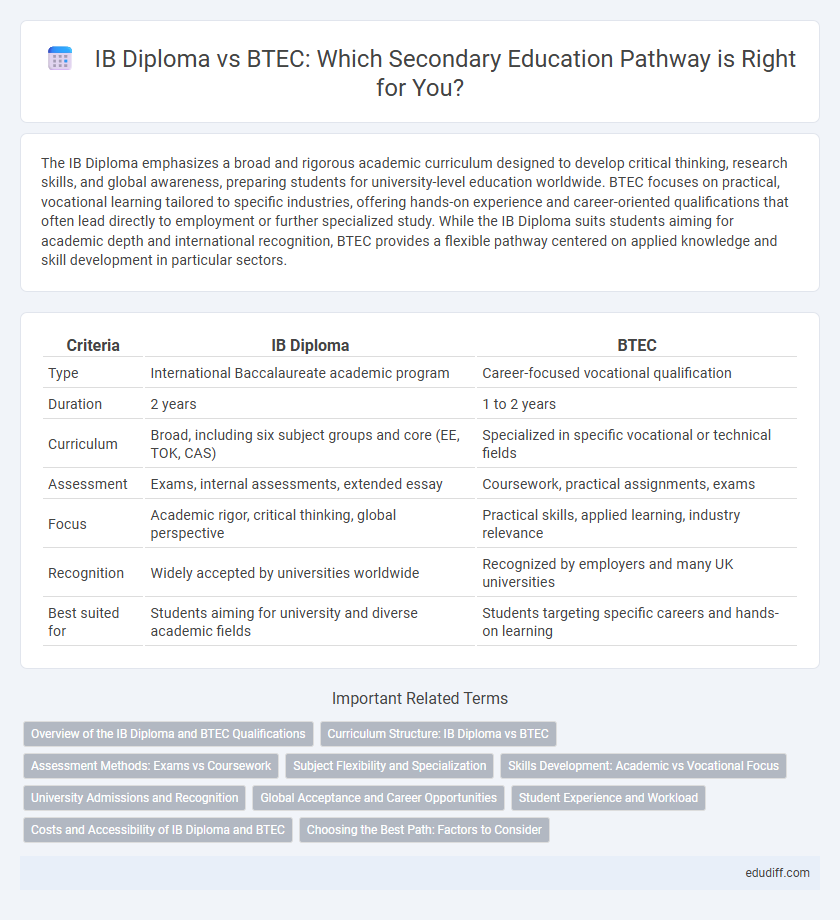The IB Diploma emphasizes a broad and rigorous academic curriculum designed to develop critical thinking, research skills, and global awareness, preparing students for university-level education worldwide. BTEC focuses on practical, vocational learning tailored to specific industries, offering hands-on experience and career-oriented qualifications that often lead directly to employment or further specialized study. While the IB Diploma suits students aiming for academic depth and international recognition, BTEC provides a flexible pathway centered on applied knowledge and skill development in particular sectors.
Table of Comparison
| Criteria | IB Diploma | BTEC |
|---|---|---|
| Type | International Baccalaureate academic program | Career-focused vocational qualification |
| Duration | 2 years | 1 to 2 years |
| Curriculum | Broad, including six subject groups and core (EE, TOK, CAS) | Specialized in specific vocational or technical fields |
| Assessment | Exams, internal assessments, extended essay | Coursework, practical assignments, exams |
| Focus | Academic rigor, critical thinking, global perspective | Practical skills, applied learning, industry relevance |
| Recognition | Widely accepted by universities worldwide | Recognized by employers and many UK universities |
| Best suited for | Students aiming for university and diverse academic fields | Students targeting specific careers and hands-on learning |
Overview of the IB Diploma and BTEC Qualifications
The IB Diploma provides a comprehensive, internationally recognized curriculum emphasizing critical thinking, research skills, and a broad range of academic subjects, fostering well-rounded students prepared for university. BTEC qualifications are vocationally focused, offering practical, career-oriented learning in fields such as business, engineering, and health care, highly valued in technical and applied sectors. Both pathways support secondary education progression, yet the IB Diploma prioritizes academic rigor while BTEC targets industry-specific skills and employability.
Curriculum Structure: IB Diploma vs BTEC
The IB Diploma features a rigorous curriculum structure comprising six subject groups, including languages, sciences, mathematics, and arts, combined with core components such as Theory of Knowledge, the Extended Essay, and CAS (Creativity, Activity, Service). In contrast, the BTEC curriculum emphasizes practical, vocational learning through specialized units tailored to specific career paths, allowing for continuous assessment based on coursework and projects. Both programs offer distinct pathways: IB's broad academic framework fosters critical thinking and research skills, while BTEC's modular design prioritizes applied knowledge and industry readiness.
Assessment Methods: Exams vs Coursework
IB Diploma assessment primarily relies on a combination of final exams and internal assessments, emphasizing critical thinking and analytical skills across six subject groups. BTEC assessment focuses on continuous coursework and practical assignments, allowing students to demonstrate applied knowledge and skills through real-world tasks. The contrasting methods highlight IB's exam-driven evaluation versus BTEC's emphasis on practical, portfolio-based assessment, catering to different learning styles and career goals.
Subject Flexibility and Specialization
The IB Diploma offers broad subject flexibility, allowing students to choose courses across six academic groups, fostering a well-rounded education ideal for those seeking balanced knowledge. In contrast, BTEC programs emphasize specialization, providing in-depth vocational training tailored to specific career paths such as engineering, health, or business. This difference in curricular focus makes IB suitable for students aiming for diverse university options, while BTEC targets practical skills for immediate employment or industry-specific higher education.
Skills Development: Academic vs Vocational Focus
The IB Diploma emphasizes critical thinking, research, and academic writing skills, preparing students for university-level study and diverse career paths. BTEC focuses on practical, hands-on skills directly relevant to specific industries, enhancing vocational competence and employability. Both programs develop essential skills but cater to different learning styles and career objectives.
University Admissions and Recognition
IB Diploma is widely recognized by universities globally for its rigorous academic framework and emphasis on critical thinking, making it a preferred qualification for competitive university admissions. BTEC qualifications are vocationally oriented and accepted by many universities, particularly in the UK, but they may be considered less academically rigorous compared to the IB Diploma. International universities often favor the IB Diploma due to its comprehensive curriculum and standardized assessment, while BTEC is valued for practical skills and career-focused education.
Global Acceptance and Career Opportunities
The IB Diploma is widely recognized by universities and employers globally, providing strong preparation for academic pursuits and international career paths. BTEC qualifications emphasize practical skills and vocational training, attracting employers in specific industries but may have limited acceptance in some universities worldwide. Students aiming for broad global acceptance and diverse career opportunities often prefer the IB Diploma for its academic rigor and international recognition.
Student Experience and Workload
The IB Diploma offers a rigorous, well-rounded curriculum emphasizing critical thinking, research, and time management, often resulting in a demanding workload with extended essays and internal assessments. BTEC focuses on practical, career-oriented learning with continuous assessment through coursework and projects, providing a more flexible and hands-on student experience. While IB students balance challenging academic demands, BTEC learners benefit from applied learning methods that can reduce exam stress and foster real-world skills.
Costs and Accessibility of IB Diploma and BTEC
The International Baccalaureate (IB) Diploma often incurs higher costs due to registration fees, examination charges, and the need for specialized teacher training, which can limit its accessibility in some schools. BTEC programs generally have lower tuition fees and flexible assessment methods, making them more accessible for a wider range of students and institutions, especially in vocational settings. Funding availability and school resources play crucial roles in determining the affordability and accessibility of both qualifications at the secondary education level.
Choosing the Best Path: Factors to Consider
Choosing the best path between the IB Diploma and BTEC depends on a student's learning style, career goals, and university plans. The IB Diploma offers a rigorous, internationally recognized curriculum ideal for students aiming for academic depth and global higher education opportunities, emphasizing critical thinking and research skills. BTEC focuses on practical, vocational learning with coursework-based assessment, suiting students who prefer hands-on experience and direct entry into specific industries or vocational training.
IB Diploma vs BTEC Infographic

 edudiff.com
edudiff.com